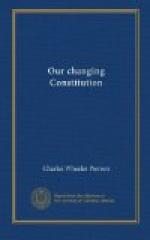[Footnote 1: United States v. Anthony, 11 Blatchford, 200.]
Mrs. Virginia Minor raised a similar question in the courts of Missouri. The Missouri constitution limited the right to vote to male citizens. Mrs. Minor applied for registration as a voter, and on being refused brought suit against the Registrar of Voters on the ground that this clause of the Missouri constitution was in violation of the Fourteenth Amendment. The Missouri state courts decided against her, and the case was taken to the Supreme Court of the United States where the decision of the state courts was affirmed.[1] The Supreme Court held in effect that while Mrs. Minor was a citizen that fact alone did not make her a voter; that suffrage was not coextensive with citizenship, either when the Constitution was adopted or at the date of the Fourteenth Amendment, and was not one of the “privileges and immunities” guaranteed by that amendment.
[Footnote 1: Minor v. Happersett, 21 Wall., 162.]
A similar decision was rendered in the matter of Mrs. Myra Bradwell’s application for a license to practise law in Illinois.[1] The Supreme Court held that the right to practise law in the state courts was not a privilege or immunity of a citizen of the United States within the meaning of the Fourteenth Amendment, and affirmed the decision of the Illinois Court denying Mrs. Bradwell’s application.
[Footnote 1: Bradwell v. Illinois, 16 Wall., 130.]
The failure of these attempts to turn the Fourteenth Amendment to the advantage of the woman suffrage movement in no wise checked the movement or discouraged its leaders. They redoubled their efforts among the separate states, and worked to such good purpose that the opposition presently began to take on the aspect of a forlorn hope. “Votes for Women” became an accomplished fact in many states, and appeared on the verge of accomplishment in most of the others. Some states, however, were still holding out when the leaders of the movement, impatient of further delay and determined to coerce the recalcitrants, took the matter into the national arena and procured the proposal and ratification of an amendment to the Federal Constitution. The amendment provides:




